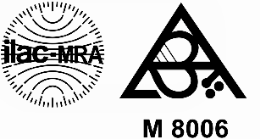Accreditation
ČIA Accreditation
The laboratory GENvia, s.r.o. has been included among the accredited laboratories since 26.1.2006, when it obtained the Certificate of Accreditation and was included in the National Registry of ČIA (Czech Institute for Accreditation) under the No. M 8006 (ČIA-registry).
The results issued by the laboratory GENvia, s.r.o. are labelled with the ČIA-mark and the laboratory number M8006, which demonstrate assurance of the highest quality of testing performed and the meeting of all requirements set in the international ISO norm No. 15 189 for clinical examinations.
List of methods accredited by ČIA, o.p.s. (Czech Institute for Accreditation):
Expertise 802 – Medical microbiology
- Examination for the presence of RNA of the SARS-CoV-2 virus by the real-time PCR (RT PCR) method
Expertise 816 – Laboratory of Medical Genetics
- Cytogenetic determination of the karyotype from the amniocytes of amniotic fluid
- Cytogenetic determination of the karyotype from fetal and peripheral blood
- Cytogenetic determination of karyotype from chorionic and aborted tissue
- Testing for aneuploidy, microdeletions and chromosomal rearrangements in cultured and uncultured cells of blood, amniotic fluid, tissue and blastomeres using FISH method
- Detection of mutations in the CFTR gene (cystic fibrosis) by PCR method followed by fragment analysis
- HLA typing by PCR method using allele-specific primers (Celiac disease, Bechterew’s disease)
- Mutation analysis of genes by massively parallel sequencing (Oncology panels, BRCA1, BRCA2, COL1A1, COL1A2 genes)
- Determination of family relatedness using STR markers by PCR method followed by fragment analysis
- Detection of microdeletions of AZFa, AZFb and AZFc areas on the Y chromosome by PCR method followed by fragment analysis
- Demonstration of thrombophilic mutations Factor V Leiden, Factor II Prothrombin, MTHFR C677T, MTHFR A1298C and PAI-1 4G/5G by real-time PCR method
- Molecular genetic examination of aneuploidies by QF PCR method
- Detection of polymorphism UGT1A1*28 conditioning formation of Gilbert’s syndrome by fluorescence PCR method and fragment analysis
- Examination of deletions and duplication of all chromosomes by the CGH microarray method
- Examination of intragenic rearrangements by MLPA method
- Examination of fragile X syndrome by PCR and Repeat Primed PCR methods
- Examination of genes by Sanger sequencing
Details on individual examinations can be found in the Laboratory section
SÚKL Certification
GENvia, s.r.o. ensures compliance with the requirements for diagnostic laboratories, according to the § 19 paragraph 2 of Act 296/2008 Coll., as amended. The State Office for Drug Control (SÚKL) allowed the diagnostic laboratory business under Decision No. sukls124246/2019 dated 12.6.2019 and included the laboratory in the Central Registry of holders of permission to operate in the area of human tissues and cells (SÚKL database).
Overview of methods certified by SÚKL (State Office for Drug Control):
- Cytogenetic karyotype determination from peripheral blood
- Examination of carriers of mutations for cystic fibrosis (CFTR gene)
- Examination of carriers of mutations for spinal muscular atrophy (SMN1 gene)
- Examination of carriers of mutations for hereditary hearing impairment (GJB2 gene)
Details on individual examinations can be found in the Laboratory section
SZÚ-permit (National Institute of Public Health)
The GENvia genetic laboratory was on 29.3.2020 granted the permission to examine the presence of SARS-CoV-2 in human material by PCR method (permission number SZU/03164/2020).
See the Laboratory section for examination details.

The accreditation (ISO norm No. 15 189)
guarantees that the laboratory follows very strict quality requirements for examinations, including regular interlaboratory inspections, internal quality audits, calibration plan compliance, etc. The accreditation is granted entirely by ČIA, o.p.s. (Czech Institute for Accreditation).
The certification (§ 9 of the Act No. 296/2008 Coll.)
ensures compliance with legislative requirements for the diagnostic laboratory, i.e. following strict conditions for preservation and handling of samples, personal data protection, regular service inspections of equipment, etc. The approval is granted entirely by SÚKL, o.p.s. (State Office for Drug Control).